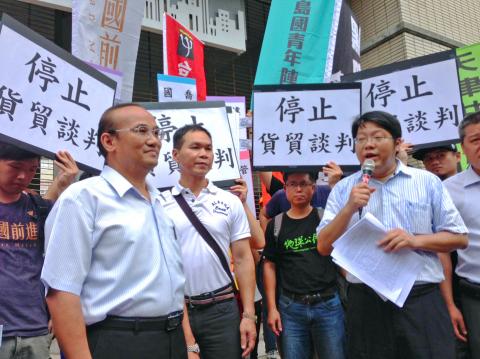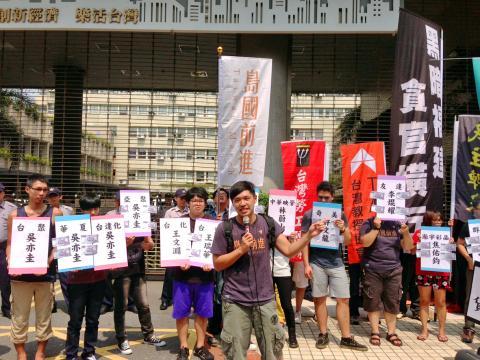Taiwan and China resumed talks on a trade in goods agreement yesterday after a nearly 11-month hiatus. However, the government has kept the talks so secret that almost all that is known is that the three-day meeting is being held somewhere in Taiwan.
However, late last night Storm Media Group (風傳媒) reported the meeting is being held at the Evergreen Resort Hotel in Yilan County’s Jiaosi Township (礁溪).
The delay in ratifying the cross-strait service trade agreement signed in June last year — because of widespread public protests and opposition parties’ delay tactics in the legislature — meant that no negotiations had been held since the last round of bilateral trade talks wrapped up in October, hampering the government’s efforts to make progress in inking a trade in goods agreement with Beijing.

Photo: CNA
Taiwan’s negotiating team for the ninth round of talks on a goods trade pact is being led by Bureau of Foreign Trade Director-General Jenni Yang (楊珍妮), while Beijing’s team is led by Chen Xing (陳星), head of the Chinese Ministry of Commerce’s Department of Taiwan, Hong Kong and Macau Affairs.
This round of talks are expected to first focus on technical issues, such as “which industrial items would be subject to tariff reductions, how tariff cuts would be introduced and preconditions for such cuts,” Minister of Economic Affairs Woody Duh (杜紫軍) said yesterday ahead of the start of the talks.
“It will take a very long time for the trade in goods agreement talks to hammer out some concrete results,” cable TV network UBN quoted Duh as saying after presiding over a handover ceremony for the Taiwan External Trade Development Council (TAITRA) in Taipei, where Cabinet adviser Francis Liang (梁國新) replaced Wang Chih-kang (王志剛) as TAITRA chairman.

Photo: CNA
“We hope [the two sides can] reach an initial consensus on certain technical issues in this meeting. We will move toward the goods trade agreement only after the Legislative Yuan resolves issues related to legislation on a mechanism for monitoring cross-strait agreements and the ratification of the service trade pact,” Duh said.
Local media reported that Taiwan plans to seek tariff reductions in the flat-panel display, machine tool, petrochemical and automobile sectors.
However, Duh said that tariff reductions to be discussed would also include between 6,000 and 7,000 items about which Taiwan’s small and medium-sized businesses care most.
The minister said the Taiwanese team would work hard to keep the opening of the local agricultural market to China at current levels. He did not elaborate.
It is not clear whether the ministry will make the content of this latest round of talks public, and if it did, when it might do so.
The secrecy surrounding the talks led representatives of several groups to protest outside the Ministry of Economic Affairs (MOEA) in Taipei. They said the proposed trade in goods pact would sacrifice the interests of Taiwanese and benefit only a few large corporations.
More than 30 protesters — including Democratic Front Against the Cross-Strait Trade in Services Agreement spokesperson Lai Chung-chiang and Sunflower movement leader Chen Wei-ting (陳為廷) — held up placards and chanted slogans, including “stop the trade in goods talks” and “MOEA, don’t play hide-and-seek.”
Industrial Development Bureau Deputy Director-General Lien Ching-chang (連錦漳) said the Taiwanese negotiators would do their best to negotiate the best deals for the country’s industries, and will “completely” protect and guard its sensitive industries.
Additional reporting by CNA

A magnitude 7.0 earthquake struck off Yilan at 11:05pm yesterday, the Central Weather Administration (CWA) said. The epicenter was located at sea, about 32.3km east of Yilan County Hall, at a depth of 72.8km, CWA data showed There were no immediate reports of damage. The intensity of the quake, which gauges the actual effect of a seismic event, measured 4 in Yilan County area on Taiwan’s seven-tier intensity scale, the data showed. It measured 4 in other parts of eastern, northern and central Taiwan as well as Tainan, and 3 in Kaohsiung and Pingtung County, and 2 in Lienchiang and Penghu counties and 1

FOREIGN INTERFERENCE: Beijing would likely intensify public opinion warfare in next year’s local elections to prevent Lai from getting re-elected, the ‘Yomiuri Shimbun’ said Internal documents from a Chinese artificial intelligence (AI) company indicated that China has been using the technology to intervene in foreign elections, including propaganda targeting Taiwan’s local elections next year and presidential elections in 2028, a Japanese newspaper reported yesterday. The Institute of National Security of Vanderbilt University obtained nearly 400 pages of documents from GoLaxy, a company with ties to the Chinese government, and found evidence that it had apparently deployed sophisticated, AI-driven propaganda campaigns in Hong Kong and Taiwan to shape public opinion, the Yomiuri Shimbun reported. GoLaxy provides insights, situation analysis and public opinion-shaping technology by conducting network surveillance

‘POLITICAL GAME’: DPP lawmakers said the motion would not meet the legislative threshold needed, and accused the KMT and the TPP of trivializing the Constitution The Legislative Yuan yesterday approved a motion to initiate impeachment proceedings against President William Lai (賴清德), saying he had undermined Taiwan’s constitutional order and democracy. The motion was approved 61-50 by lawmakers from the main opposition Chinese Nationalist Party (KMT) and the smaller Taiwan People’s Party (TPP), who together hold a legislative majority. Under the motion, a roll call vote for impeachment would be held on May 19 next year, after various hearings are held and Lai is given the chance to defend himself. The move came after Lai on Monday last week did not promulgate an amendment passed by the legislature that

AFTERMATH: The Taipei City Government said it received 39 minor incident reports including gas leaks, water leaks and outages, and a damaged traffic signal A magnitude 7.0 earthquake struck off Taiwan’s northeastern coast late on Saturday, producing only two major aftershocks as of yesterday noon, the Central Weather Administration (CWA) said. The limited aftershocks contrast with last year’s major earthquake in Hualien County, as Saturday’s earthquake occurred at a greater depth in a subduction zone. Saturday’s earthquake struck at 11:05pm, with its hypocenter about 32.3km east of Yilan County Hall, at a depth of 72.8km. Shaking was felt in 17 administrative regions north of Tainan and in eastern Taiwan, reaching intensity level 4 on Taiwan’s seven-tier seismic scale, the CWA said. In Hualien, the